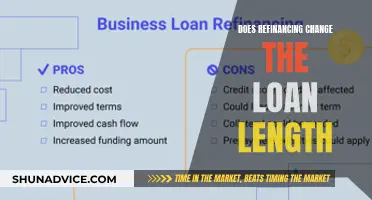
Sallie Mae offers private student loans for graduate school. The Sallie Mae Graduate School Loan has two interest rates to choose from: a fixed rate and a variable rate. The fixed rate offers predictable monthly payments that don't change over time, while the variable rate means that the interest rate can rise or fall as the market index changes, causing your payments to vary. With the Sallie Mae Graduate School Loan, you can get up to 100% of your school fees covered each year. The company is also known to be one of the most lenient lenders, even allowing for cosigner release after just 12 on-time monthly payments.
| Characteristics | Values |
|---|---|
| Loan type | Private student loans |
| Fields of study | Business, medical, dental, law, health professions, MBA, bar exam, relocation for medical and dental residencies, master's, doctoral degrees |
| Interest rate type | Fixed or variable |
| Repayment options | Fixed and deferred repayment options, interest repayment option |
| Discounts | 0.25% interest rate discount if the borrower or cosigner enrolls in auto debit through Sallie Mae |
| Cosigner release | Available after 12 on-time monthly payments |
| Maximum loan amount | Up to 100% of school fees covered each year |
| Application | E-sign and accept the loan |
What You'll Learn

Sallie Mae's graduate school loan interest rates
Sallie Mae offers private student loans for graduate school. The Sallie Mae Graduate School Loan has two interest rates to choose from: a fixed rate and a variable rate.
The fixed rate option offers predictable monthly payments with an interest rate that stays the same throughout the life of the loan. The rate for this option ranges from 3.49% to 14.48% APR.
On the other hand, the variable rate option has an interest rate that can rise or fall as the market index changes, resulting in varying monthly payments. The rate for this option ranges from 4.54% to 13.98% APR.
It's important to note that advertised variable rates are the starting range of rates and may fluctuate outside of that range during the loan period. Interest begins to accrue as soon as the funds are sent to the school.
To receive a 0.25% interest rate discount, borrowers or cosigners must enroll in auto-debit through Sallie Mae. This discount is only applicable during active repayment and may be suspended during forbearance or deferment.
Sallie Mae also offers graduate student loans for specific fields of study, such as medical, dental, health professions, MBA, law, and master's/doctorate programs. Additionally, they provide loans for students studying for the bar exam or relocating for medical and dental residencies.
When considering a graduate loan, it's important to review all loan documents carefully to understand your responsibilities and choose the option that best suits your needs.
Understanding S-Corp Loan Basis and Beneficiary Taxation
You may want to see also

Applying for a Sallie Mae graduate loan
Interest Rates
Sallie Mae offers two interest rates for graduate school loans: a fixed rate and a variable rate. The fixed rate is between 3.49% and 14.48% APR, and this rate will not change over time, giving you predictable monthly payments. The variable rate is between 4.54% and 13.98% APR, and this rate can rise or fall as the market index changes, so your payments may vary.
Applying for a Loan
Before applying, you should consider whether you need a cosigner. If you have little or no credit history, a cosigner can increase your chances of approval and may help you get a better interest rate. Last year, 88% of Sallie Mae undergraduate loans were cosigned. You should also use Sallie Mae's student loan repayment calculator to estimate monthly loan payments.
When you apply, you will need to submit an application and undergo a credit review. After approval, you will choose your loan option, selecting whether to make payments during school or defer them, and then choose your interest rate. Applications submitted directly to Sallie Mae cannot exceed the cost of attendance less financial aid received, as certified by the school.
Repayment Options
Sallie Mae offers two repayment options: Fixed and Deferred Repayment, and Interest Repayment. With the Fixed and Deferred Repayment option, the interest rate is higher, and unpaid interest is added to the loan's current principal at the end of the grace/separation period. With the Interest Repayment option, the interest rate is lower, and you will pay less over time.
To receive a 0.25% interest rate discount, the borrower or cosigner must enroll in auto-debit through Sallie Mae. This discount only applies during active repayment and may be suspended during forbearance or deferment.
Other Things to Consider
If you have existing student loan debt, you can still apply for a graduate student loan. After you apply and undergo a credit review, Sallie Mae will determine whether you are eligible for another loan. You should also keep in mind that your school may have a deadline for financial aid to be submitted, so make sure you apply with enough time for your application to be processed.
Progressive Finance Cash Loans: What You Need to Know
You may want to see also

Cosigners and cosigner release
Sallie Mae offers private student loans for graduate school. These loans are designed for your planned field of study. Graduate students can also apply for federal loans, which are funded by the federal government.
A cosigner is a creditworthy adult who signs your loan and is equally responsible for paying it back on time and in full. Since private student loans are credit-based and many students don’t have a credit history yet, a cosigner with good credit can make it easier for the loan to be approved and may help you get a better rate. A cosigner can be a parent, relative, guardian, friend, or spouse. Last year, 88% of Sallie Mae undergraduate loans were cosigned, and students were 3.5x more likely to be approved for a loan with a cosigner.
After you graduate, you can apply to release your cosigner from any open and active loans. Only the borrower can apply for cosigner release. To do so, you must meet the age of majority in your state, provide proof of graduation, income, and U.S. citizenship or permanent residency, and demonstrate the ability to assume full responsibility for the loan(s) and pass a credit review. The loan can't be past due when the cosigner release application is processed.
PSLF Covers Only Federal Loans, Not Private Ones
You may want to see also

Repayment options
Sallie Mae offers graduate students private student loans. The repayment options for these loans vary depending on whether the loan is a federal or private loan.
Federal Loans
Federal student loans are required by law to provide a range of flexible repayment options. These include income-based repayment, income-contingent repayment plans, loan forgiveness, and deferment benefits. Federal loans are also available to students regardless of income, although they generally have origination fees.
Private Loans
Private student loans are offered by banks, credit unions, and other financial institutions. These loans are based on the borrower's creditworthiness, meaning the lender will check the borrower's history of borrowing money and paying it back on time.
Sallie Mae offers private student loans for graduate school. The repayment options for these loans include fixed and deferred repayment options, as well as interest repayment options. With the fixed and deferred repayment options, the interest rate is higher, and unpaid interest is added to the loan's current principal at the end of the grace/separation period.
To receive a 0.25% interest rate discount, the borrower or cosigner must enroll in auto-debit through Sallie Mae. This discount applies only during active repayment and may be suspended during forbearance or deferment.
Additionally, borrowers with a 27-month in-school and separation period may receive a 0.25% interest rate reduction benefit. This benefit applies only during active repayment and may also be suspended during forbearance or deferment.
It is important to note that repayment terms may vary by lender, and borrowers may be able to save money by paying off their loans sooner.
Private Loan Greenpath: A Smart Financial Move?
You may want to see also

Sallie Mae's graduate loans vs. federal loans
Sallie Mae offers private student loans for graduate school. The Sallie Mae Graduate School Loan offers two interest rates: a fixed rate and a variable rate. The fixed rate is between 3.49% and 14.48% APR, with predictable monthly payments that don't change over time. The variable rate is between 4.54% and 13.98% APR, which means that the interest rate can rise or fall as the market index changes, so your payments may vary.
With the Fixed and Deferred Repayment Options, the interest rate is higher than with the Interest Repayment Option, and Unpaid Interest is added to the loan’s Current Principal at the end of the grace/separation period. To receive a 0.25% interest rate discount, the borrower or cosigner must enrol in auto-debit through Sallie Mae. This discount only applies during active repayment and may be suspended during forbearance or deferment.
Sallie Mae also offers private loans for graduate students studying for the bar exam or relocating for medical and dental residencies. These loans are based on the applicant's creditworthiness.
Federal student loans, on the other hand, are funded by the federal government. Grad students can apply for Direct Loans and Direct Graduate PLUS Loans by filling out a FAFSA. Direct Graduate PLUS Loans are available to graduate and professional students and are part of the federal Direct PLUS Loan program. The federal direct unsubsidized loan limit is $20,500 per year, or $40,500 for certain medical training.
Federal student loans offer more flexibility in repayment options, and some provide income-driven repayment plans. With federal loans, you can change your repayment plan even after taking out the loan. Private student loans usually don't offer the same flexibility, and you generally can't change your repayment plan after taking out the loan.
Interest rates for private graduate loans are generally higher than for federal loans, but highly qualified borrowers may receive a lower interest rate than with a Direct Graduate PLUS Loan.
Refinance Loans: Reali's Offerings and Your Options
You may want to see also
Frequently asked questions
Yes, Sallie Mae offers private student loans for graduate school.
The Sallie Mae Graduate School Loan has two interest rates to choose from: a fixed rate and a variable rate. Fixed rates are between 3.49% and 14.48% APR, and variable rates are between 4.54% and 13.98% APR.
Sallie Mae graduate loans offer a choice of fixed or variable interest rates, no origination fee, and the option to make payments while in graduate school or defer them until after graduation. You can also pay up to all of your school-certified expenses.
You can apply for a Sallie Mae graduate loan through the Sallie Mae website or a partner website. However, applying through a partner website will result in a lower maximum loan request amount.







